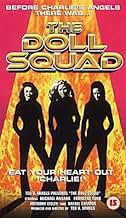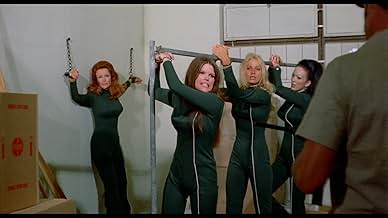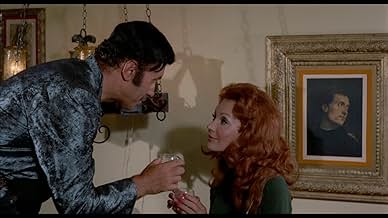CALIFICACIÓN DE IMDb
4.4/10
1.2 k
TU CALIFICACIÓN
Agrega una trama en tu idiomaSquad of beautiful government agents tries to catch saboteurs.Squad of beautiful government agents tries to catch saboteurs.Squad of beautiful government agents tries to catch saboteurs.
- Dirección
- Guionistas
- Elenco
Herb Robins
- Munson
- (as Herb Robbins)
Gustaf Unger
- Dr. Cahaymen
- (as Gustave Unger)
- Dirección
- Guionistas
- Todo el elenco y el equipo
- Producción, taquilla y más en IMDbPro
Opiniones destacadas
The Doll Squad pre-dates the hugely successful television series Charlie's Angels (1976 - 1981), and it's intentions are similar. After a catastrophic space shuttle launch, the clandestine group of government agents, must form to conquer this criminal conspiracy. Sabrina Kincaid (Francine York) is called to gather the scattered doll squad, a group of female agents. Practically all American films and television in the 1970's that involved crime were embroiled in conspiracy, from Starsky and Hutch (1975 - 1979), Police Woman (1974 - 1978) to The Amazing Spider-Man (1977 - 1979), and this film seems to have paved the way. It's certainly true that the producer of Charlie's Angels (Aaron Spelling) did go to the premier of The Doll Squad.
The films production is obviously incredibly low budget. Ted V. Mikels was previously known for the grindhouse cheapie's The Corpse Grinders (1971) and Blood Orgy of the She-Devils (1972), but this film's production values certainly rise above the limitations, and also look a lot better than the horror films. Where the film really fails is in the pace. It struggles through several clunky dialogue scenes, and often uses a piece of funky, disco-esque soundtrack (which is used far too much throughout the film) seemingly to attempt to give a dull scene a bit of pep - such as what appears to be either a fast walk down a long corridor, or a slow walk in a short one.
However, when the action does heighten, and that same piece of music is used appropriately, the film does have its moments of fun. It's always good to see the heavily made-up, statuesque '70's women beating up the weak men, from the women in prison movies, to proto-punk Switchblade Sisters (1975) - and of course their raison-d'etre, seduction. The film also boasts an appearance by Tura Satana, who was electric in Russ Meyer's Faster Pussycat. Kill! Kill! (1965). Whilst the film has it's lagging moments, and tedious dialogue, it doesn't ever really become boring. All the limitations actually function well within the context of the ludicrous scenes, and gives the film humour. A lasting example would be, of course, the technical effects for explosions. Mikels's solution? Superimpose a flare of red over the exploded object, then cutting object out: ridiculous, cheap-as-chips, hilarious!
The films production is obviously incredibly low budget. Ted V. Mikels was previously known for the grindhouse cheapie's The Corpse Grinders (1971) and Blood Orgy of the She-Devils (1972), but this film's production values certainly rise above the limitations, and also look a lot better than the horror films. Where the film really fails is in the pace. It struggles through several clunky dialogue scenes, and often uses a piece of funky, disco-esque soundtrack (which is used far too much throughout the film) seemingly to attempt to give a dull scene a bit of pep - such as what appears to be either a fast walk down a long corridor, or a slow walk in a short one.
However, when the action does heighten, and that same piece of music is used appropriately, the film does have its moments of fun. It's always good to see the heavily made-up, statuesque '70's women beating up the weak men, from the women in prison movies, to proto-punk Switchblade Sisters (1975) - and of course their raison-d'etre, seduction. The film also boasts an appearance by Tura Satana, who was electric in Russ Meyer's Faster Pussycat. Kill! Kill! (1965). Whilst the film has it's lagging moments, and tedious dialogue, it doesn't ever really become boring. All the limitations actually function well within the context of the ludicrous scenes, and gives the film humour. A lasting example would be, of course, the technical effects for explosions. Mikels's solution? Superimpose a flare of red over the exploded object, then cutting object out: ridiculous, cheap-as-chips, hilarious!
'The Doll Squad' is testimony to Ted V. Mikel's complete lack of talent, in that he can take the idea of a team of beautiful assassins who must save the world from an evil mastermind intent on infecting us all with bubonic plague, and make it COMPLETELY BORING. On paper this looks like it could be a wonderfully trashy and camp 1970s experience, the kind of movie parodied with such skill and fun in the Austin Powers series. Actually trying to sit through it and stay awake is another matter! Mikel's woeful direction, the no-budget special effects, and the awful acting throughout make it almost painful to endure. Even the semi-naked appearance of the legendary Tura Satana ( from Russ Meyer's classic 'Faster Pussycat!') can't save this turkey!
Ted V Mikels is a kitsch director whose best work rises above practical efforts at criticism. He produced the films most highly regarded amongst a coterie of fans over just few years: The Astro Zombies' (1969), The Corpse Grinders' (1972), and Blood Orgy of The She Devils' (1972), each have their following and have endured on video. As the last of Mikel's trash favourites to appear, 'The Doll Squad' contains the least horror and fantasy and, in comparison to it's predecessors, adheres more closely to a logical dramatic structure. Since then, although he had remained active - most recently with Dimension of Fear' (1998) - Mikels has produced nothing else regarded by fans with such long-lived affection. Firmly in the realms of so-bad-it's-good, the years have added an enjoyable sheen to The Doll Squad', particularly now that it can be taken with the gloss of post-modern irony.
This is the film whose central premise - Mikels allegedly claimed - was ripped off by producer Aron Spelling to become the television series Charlie's Angels'. No doubt the reissue of Doll Squad' has also been at least in part inspired by the commercial success and marketing of the big screen version of that programme. Comparison of Mikels' film with Spelling's work does reveal similarities. But nothing in the TV Charlie's Angels', or the recent Hollywood outing compares to Mikel's wide-eyed glance at the genre, the cheesy pulchritude on display and his disregard for dramatic standards.
The Doll Squad is selected for assignment by computer, after it picks up 'something in O'Riley's personality which means experienced women should do the job' of stopping him. 'Experience' in this context naturally implies more than just familiarity with tough assignments. The squad of Sabrina, Liz, Sharon, Lavelle and Kim hail from different backgrounds, including a librarian, a scientist, karate instructor and, most noticeably, erotic dancer (played by Tura Satana, the Apache-Japanese better known for her role in Russ Meyer's far more provocative 'Faster Pussy Cat, Kill Kill!' (1965)).
It might be argued that, as a group of strong assertive women, the Doll Squad is a model of feminine self-reliance. After all, they are empowered to find and stop the villainous O'Riley by a senator, and are allowed complete independence and licence for the duration of their mission. But their assertiveness is essentially apolitical and, except for their expected impact on the criminal community, always non-threatening and contained within fantasy. The choice of squad personnel, obviously intended as a cross section of female society, merely emphasises a common voluptuousness. In tandem with the women's physical stamina, Mikel creates through this all-too familiar trash archetypes
Leaving aside its relationship to 'Charlie's Angels', the most striking element of Mikels' film is its flat playfulness. Like most favourite cult trash directors, he is cheerfully oblivious to the handicaps of abilities and material. For the viewer, of course this is part of the fun. It would be pointless here to refer in detail to the fluffed lines, one-dimensional plot and rudimentary cutting and pacing. Instead, a viewer best engages with the film on a naïve level, such (presumably) as the director/producer/co writer did, or by assuming a knowing camp sophistication. There's more than a degree of that to be found in the flame-thrower cigarette lighter, for instance, the lame kung fu, or the exploding poison. These days The Doll Squad' is more likely to leave the knowing viewer with a wink than a grimace, as it plays its simple variation on the espionage thriller. As a z-grade auteur, Mikels, resolutely goes his own way in the film, immune to the strictures of any responsible' judgement, incidentally striking a chord with the modern viewer which he could hardly had anticipated at the time.
However one approaches the film, it still has the distinct straight-faced charm which has kept it a favourite down the years. Helped by a surprisingly strong musical score, and photographed competantly, The Doll Squad', beehive hair cuts and cheesy décor intact, has dated pleasantly and remains a guilty pleasure.
This is the film whose central premise - Mikels allegedly claimed - was ripped off by producer Aron Spelling to become the television series Charlie's Angels'. No doubt the reissue of Doll Squad' has also been at least in part inspired by the commercial success and marketing of the big screen version of that programme. Comparison of Mikels' film with Spelling's work does reveal similarities. But nothing in the TV Charlie's Angels', or the recent Hollywood outing compares to Mikel's wide-eyed glance at the genre, the cheesy pulchritude on display and his disregard for dramatic standards.
The Doll Squad is selected for assignment by computer, after it picks up 'something in O'Riley's personality which means experienced women should do the job' of stopping him. 'Experience' in this context naturally implies more than just familiarity with tough assignments. The squad of Sabrina, Liz, Sharon, Lavelle and Kim hail from different backgrounds, including a librarian, a scientist, karate instructor and, most noticeably, erotic dancer (played by Tura Satana, the Apache-Japanese better known for her role in Russ Meyer's far more provocative 'Faster Pussy Cat, Kill Kill!' (1965)).
It might be argued that, as a group of strong assertive women, the Doll Squad is a model of feminine self-reliance. After all, they are empowered to find and stop the villainous O'Riley by a senator, and are allowed complete independence and licence for the duration of their mission. But their assertiveness is essentially apolitical and, except for their expected impact on the criminal community, always non-threatening and contained within fantasy. The choice of squad personnel, obviously intended as a cross section of female society, merely emphasises a common voluptuousness. In tandem with the women's physical stamina, Mikel creates through this all-too familiar trash archetypes
Leaving aside its relationship to 'Charlie's Angels', the most striking element of Mikels' film is its flat playfulness. Like most favourite cult trash directors, he is cheerfully oblivious to the handicaps of abilities and material. For the viewer, of course this is part of the fun. It would be pointless here to refer in detail to the fluffed lines, one-dimensional plot and rudimentary cutting and pacing. Instead, a viewer best engages with the film on a naïve level, such (presumably) as the director/producer/co writer did, or by assuming a knowing camp sophistication. There's more than a degree of that to be found in the flame-thrower cigarette lighter, for instance, the lame kung fu, or the exploding poison. These days The Doll Squad' is more likely to leave the knowing viewer with a wink than a grimace, as it plays its simple variation on the espionage thriller. As a z-grade auteur, Mikels, resolutely goes his own way in the film, immune to the strictures of any responsible' judgement, incidentally striking a chord with the modern viewer which he could hardly had anticipated at the time.
However one approaches the film, it still has the distinct straight-faced charm which has kept it a favourite down the years. Helped by a surprisingly strong musical score, and photographed competantly, The Doll Squad', beehive hair cuts and cheesy décor intact, has dated pleasantly and remains a guilty pleasure.
This highly entertaining action flick is from the legendary Ted V Mikels, director of The Astro-Zombies and The Corpse Grinders. The Doll Squad is a laugh-a-minute cheese-fest of the first order. Mikels apparently sued Aron Spelling for nicking his idea and creating Charlie's Angels. Well, I don't know about that, but what I do know is that I would've been perfectly happy if there had been a series based on this movie. The basic premise is one that really you cannot go wrong with – a group of sexy action chicks take on an evil genius and his army of boneheads and save the day. It's a perfect recipe. What makes it so much fun is that the cheese-factor is in hyper-drive.
The film is ram-packed with action from start to finish. Lots of machine-gun toting babes, girls high-kicking men in the face, amazingly fake looking explosions and an array of ludicrous gadgetry. We have bad guys who blow up after drinking explosive vodka, an evil character who has his face set on fire by a cigarette lighter flame thrower and an undercover agent with fake face who is unmasked in a hilarious Scooby Doo style fashion. And for some reason the bad guys travel around in cars sitting on the bonnets, while the Doll Squad navigate the rough terrain of the island in high-heeled boots. Everything is accompanied by the most 70's soundtrack ever recorded. The film is just an endless succession of seriously silly events.
The only member of the cast I recognized was Tura Satana from Faster Pussycat! Kill! Kill! fame. She is strangely subdued it has to be said but it's always nice to see her. The rest of the Dolls are completely unfamiliar to me but they all just get stuck in and kick butt at every opportunity. There is a perhaps surprising lack of nudity but it doesn't really matter. The Doll Squad is a blast from start to finish and I strongly disagree with the view held by some that it is boring at all. It's loads of fun.
The film is ram-packed with action from start to finish. Lots of machine-gun toting babes, girls high-kicking men in the face, amazingly fake looking explosions and an array of ludicrous gadgetry. We have bad guys who blow up after drinking explosive vodka, an evil character who has his face set on fire by a cigarette lighter flame thrower and an undercover agent with fake face who is unmasked in a hilarious Scooby Doo style fashion. And for some reason the bad guys travel around in cars sitting on the bonnets, while the Doll Squad navigate the rough terrain of the island in high-heeled boots. Everything is accompanied by the most 70's soundtrack ever recorded. The film is just an endless succession of seriously silly events.
The only member of the cast I recognized was Tura Satana from Faster Pussycat! Kill! Kill! fame. She is strangely subdued it has to be said but it's always nice to see her. The rest of the Dolls are completely unfamiliar to me but they all just get stuck in and kick butt at every opportunity. There is a perhaps surprising lack of nudity but it doesn't really matter. The Doll Squad is a blast from start to finish and I strongly disagree with the view held by some that it is boring at all. It's loads of fun.
The only other Ted V. Mikels film I had seen before this is "Blood Orgy of the She-Devils". And the only thing I remember about it is that it was completely awful. Thankfully, "The Doll Squad" is considerably better. It is crudely directed, with often poor continuity and laughable "special effects" (low points: the fake explosions). But it is also ahead of its time: how many films do you suppose had been made before 1973 featuring female commandos using guns, explosives and martial arts to wipe out small armies of bad men? Not many, that's for sure. Whether dressed in their bikinis or in their tight, form-fitting uniforms, the women in this film look good, and handle their basic action scenes fairly well. So "The Doll Squad" may not be art (far from it, in fact), but from a female action cinema fan's perspective, it delivers where it counts. (**)
¿Sabías que…?
- TriviaIt is speculated that Aaron Spelling got the idea for Los ángeles de Charlie (1976) after attending the premier of this film.
- ErroresThe finale of the film supposedly takes place on a remote island off the coast of South America, yet the vehicles driven by the bad guys bear Montana license plates.
- Versiones alternativasThe film was originally shown in two versions, both possibly uncut, with different posters aiming at different markets: The Doll Squad, rated PG, distributed by Geneni Film; and Seduce and Destroy, rated R, by Dinero Productions.
- ConexionesFeatured in The Wild World of Ted V. Mikels (2008)
Selecciones populares
Inicia sesión para calificar y agrega a la lista de videos para obtener recomendaciones personalizadas
- How long is The Doll Squad?Con tecnología de Alexa
Detalles
Contribuir a esta página
Sugiere una edición o agrega el contenido que falta

Principales brechas de datos
By what name was The Doll Squad (1973) officially released in India in English?
Responda



























